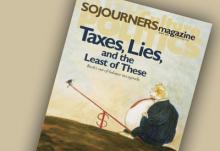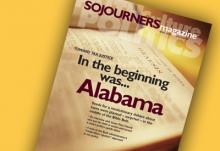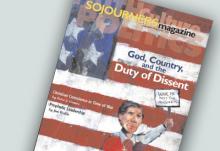The federal excise tax on long-distance phone calls, which began as part of the Spanish-American War effort in 1898, was repealed in May by the U.S. Treasury Department.
Taxes
Wow! Sojourners has an excellent and major article on healing, arguably the focus of Jesus’ ministry (“The Stumbling Block of Healing,” by Dee Dee Risher, June 2006).
The nonprofit status of All Saints Episcopal Church in Pasadena, California, is being challenged by the Internal Revenue Service because of a sermon in which parishioners were asked to imagine a

The elite few benefit from the Bush tax agenda. The rest of us get stuck with the bill.

For political strategist Grover Norquist, tax policy is just a means to a brutish end.

Bush's tax policy is aimed at drastically reducing government services and moving the tax burden to poorer wage-earners. The result: a case of "trickle-down injustice."
In the recently published collection of excerpts from William Sloane Coffin's speeches and sermons -Credo- appears this gem: "When the rich take from the poor, it's called an economic plan."
Susan Pace Hamill, a professor at the University of Alabama Law School specializing in federal corporate tax law, had previously worked at two prestigious law firms and at the IRS. Her research on the Alabama tax code—the most regressive and harsh on the working poor of any in the country—led her to write "An Argument for Tax Reform Based on Judeo-Christian Ethics." Her article convinced Alabama's conservative Republican Gov. Bob Riley to propose a state constitutional amendment that would have revolutionized tax policy in Alabama. The proposal failed in the 2003 vote, but the reform work continues—with the potential of spurring a nationwide movement for tax justice. This is her story, as told to Sojourners associate editor Julie Polter.
I had lived in Alabama seven years, which has more taxes than you could shake a stick at, and I had never focused on the state and local inequity. I'm not proud of that. However, I did notice that the first property tax bill for our house was so low that I thought it was for the month instead of the year. I read grocery sales slips thinking, "That's too high on groceries, that's not right." And every year for state income tax I would get refunds while I was writing checks to Uncle Sam.
Meanwhile, my kids are attending a C- funded school system, one of the few in the state I deem minimally adequate, and every year the teachers are begging for donations to cover things. The signs of inequity were there, but I refused to put them together because I didn't view it as my problem. I would think, "I'm not a state and local tax specialist. I'm a federal person—I'm too busy."
Then I took sabbatical to attend Beeson Divinity School at Samford University in Birmingham, a primarily Southern Baptist institution. At Beeson, another sign came under my nose: A little newspaper article about a big Washington, D.C. think-tank study on income taxes that ranked Alabama the worst. It stated, "Alabama's Income Tax Least Fair," and cited a $4,600 threshold [at which income-tax liability begins]. My first instinct was "That has to be a misprint! Even if we're the worst, that can't possibly be true."
WILLIAM H. GATES Sr. and Chuck Collins are clear and persuasive in their January-February article "Tax the Rich?"

William Gates Sr.—whose son is Microsoft founder Bill Gates—joins with co-author Chuck Collins to argue that the wealthiest among us have an obligation to pay their fair share.
The last day of the year is, somehow, a good day to settle things. And so it was for us on December 31, 1993.
